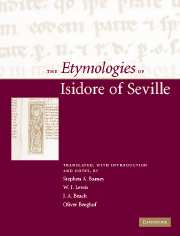Book contents
- Frontmatter
- Contents
- Acknowledgements
- Note to the Reader
- INTRODUCTION
- THE ETYMOLOGIES
- Analytical table of contents
- Book I Grammar (De grammatica)
- Book II Rhetoric and dialectic (De rhetorica et dialectica)
- Book III Mathematics (De mathematica)
- Book IV Medicine (De medicina)
- Book V Laws and times (De legibus et temporibus)
- Book VI Books and ecclesiastical offices (De libris et officiis ecclesiasticis)
- Book VII God, angels, and saints (De deo, angelis et sanctis)
- Book VIII The church and sects (De ecclesia et sectis)
- Book IX Languages, nations, reigns, the military, citizens, family relationships (De linguis, gentibus, regnis, militia, civibus, affinitatibus)
- Book X Vocabulary (De vocabulis)
- Book XI The human being and portents (De homine et portentis)
- Book XII Animals (De animalibus)
- Book XIII The cosmos and its parts (De mundo et partibus)
- Book XIV The earth and its parts (De terra et partibus)
- Book XV Buildings and fields (De aedificiis et agris)
- Book XVI Stones and metals (De lapidibus et metallis)
- Book XVII Rural matters (De rebus rusticis)
- Book XVIII War and games (De bello et ludis)
- Book XIX Ships, buildings, and clothing (De navibus aedificiis et vestibus)
- Book XX (Provisions and various implements)
- APPENDIX Correspondence of Isidore and Braulio
- INDEX
Book XV - Buildings and fields (De aedificiis et agris)
Published online by Cambridge University Press: 22 September 2009
- Frontmatter
- Contents
- Acknowledgements
- Note to the Reader
- INTRODUCTION
- THE ETYMOLOGIES
- Analytical table of contents
- Book I Grammar (De grammatica)
- Book II Rhetoric and dialectic (De rhetorica et dialectica)
- Book III Mathematics (De mathematica)
- Book IV Medicine (De medicina)
- Book V Laws and times (De legibus et temporibus)
- Book VI Books and ecclesiastical offices (De libris et officiis ecclesiasticis)
- Book VII God, angels, and saints (De deo, angelis et sanctis)
- Book VIII The church and sects (De ecclesia et sectis)
- Book IX Languages, nations, reigns, the military, citizens, family relationships (De linguis, gentibus, regnis, militia, civibus, affinitatibus)
- Book X Vocabulary (De vocabulis)
- Book XI The human being and portents (De homine et portentis)
- Book XII Animals (De animalibus)
- Book XIII The cosmos and its parts (De mundo et partibus)
- Book XIV The earth and its parts (De terra et partibus)
- Book XV Buildings and fields (De aedificiis et agris)
- Book XVI Stones and metals (De lapidibus et metallis)
- Book XVII Rural matters (De rebus rusticis)
- Book XVIII War and games (De bello et ludis)
- Book XIX Ships, buildings, and clothing (De navibus aedificiis et vestibus)
- Book XX (Provisions and various implements)
- APPENDIX Correspondence of Isidore and Braulio
- INDEX
Summary
i. Cities (De civitatibus) 1. Frequently we find dissension about who was responsible for the founding of cities, to such an extent that not even the origin of the city of Rome can accurately be known. Thus Sallust says (War with Catiline 6), “As I understand it, at first the Trojans, and with them the native peoples, first founded and settled the city of Rome.” Others say the founding was by Evander, as Vergil (Aen. 8.313):
Then King Evander, founder of the Roman citadel …
Others, by Romulus, as (Vergil, Aen. 6.781):
Behold, my son, under his (i.e. Romulus's) auspices that illustrious Rome …
2. Hence if no sure account of so great a city is available, it is no wonder that there is some doubt about opinion concerning other cities. Therefore we should not ignorantly condemn the historians and commentators who allege various things, for antiquity itself created the error. It is indeed proper to treat briefly some cities concerning which either the Sacred Scriptures or pagan histories reliably report the origin.
3. Before the Flood, Cain was the first to found a city, the city of Enoch in Naid, after the name of his son, and he filled that city with only the throng of his own descendants. 4. After the Flood, the giant Nimrod (Nembroth) first founded the Mesopotamian city of Babylon. Queen Semiramis of the Assyrians enlarged it, and made the wall of the city with bitumen and fired brick.
- Type
- Chapter
- Information
- The Etymologies of Isidore of Seville , pp. 301 - 316Publisher: Cambridge University PressPrint publication year: 2006



